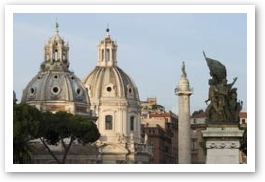Ignoring Europe's Foundations
- REV. RAYMOND DE SOUSA
The death rattles of the European Union's constitution have produced much fretting over the future of Europe. Yet the future is in doubt precisely because so much of the past has been forgotten.
 |
Not the recent past, which is very much on the European mind. In the final days of the constitutional campaign in France, various leaders went into rhetorical overdrive, saying that rejecting the new constitution would risk plunging Europe into another great war or another Holocaust. Whatever its merits as a political strategy — Vote Oui or people will die! — it betrayed the historical myopia that afflicts the EU leadership.
The historical vision of the EU goes back to the two world wars, or perhaps back to the Franco-Prussian War of 1870. The experience of two of the continent's leading powers, France and Germany, waging war on each other three times in seven decades led Europe's leaders to conclude that peace required a straitjacket that would bind the two so closely that war would no longer be possible. The result was the economic integration agreements which, in various forms, finally produced the EU trade and customs union.
As a peace and security strategy, it worked marvellously well. With the United States guaranteeing the security of Western Europe, it made large military forces unnecessary. And with the added economic benefits of free trade and free-flowing capital and labour, Europe got an economic bonus from its shackling of French and German militarism.
That was more than enough for the initial modest goals of the EU — a zone of peace and prosperity in a part of the world too often given to war. But as the EU project shifted to something much grander, the mere absence of war-making was too weak a foundation upon which to build it. If Europe is to fashion a single political unit — complete with common currency, fiscal policy, defence, foreign minister, chief executive — then something much greater is needed.
To ask what that might be is to ask what constitutes the foundations of Europe in the first place. Europe is not unified by language or ethnicity, as is, say, the Arab world. Pan-Arabism is an ethnic project in a way that pan-Europeanism could never be. Neither is Europe the product of a shared colonial history in the way that parts of Africa and Latin America are. Indeed, Europe is only a very elastic geographic unit, as the peoples and cultures (and food!) that have grown up around the Mediterranean and Baltic Seas testify in their diversity.
Europe above all is a cultural idea. When the Roman Empire disintegrated it was not clear what, if anything, would replace it. Would there be a centre that could unite Sicilians with Hibernians? Indeed, as various kingdoms and principalities and duchies spun out of the empire, it was evident that neither economics nor politics could provide the centre of unity.
It was instead a common faith that created Europe. Christianity united the diverse European nations, so much so that the divisions in Christianity produced political divisions, even wars, and vice versa. The old joke was that the Holy Roman Empire was not holy, not Roman and not an empire, but it was the product of the Christian ties that defined Europe.
That Europe is long gone, as Europeans are no longer a generally religious people, and their elites are militantly secularist. The achievements of the Enlightenment, considerable as they were, also produced a this-worldly politics that gave rise to more than two centuries of wars and totalitarianisms from the French Revolution on. How then to build the new Europe?
Europe may aspire to a political unity approximating that of the United States, but the U.S. has a creed which unites it. No such creed exists in Europe. The new constitution attempted to provide such a thing, but it's hard to pledge one's allegiance to a series of voting mechanisms or a social welfare policy. It was rejected in France and the Netherlands for many (conflicting) reasons, but not least because the new constitution had no heart. The old European heart was Christian — confusedly so, and subject to many corruptions to be sure, but Christian nevertheless.
Christianity today has been pushed to the margins of European political life, so that now a great empty shrine sits in Brussels, contemporary heir to the Holy Roman Empire. It is not easy to fill an empty shrine, and a standardized pan-European working week just won't do it. If Europe wishes to be united by more than trade and customs agreements, it will have to find something ennobling to which it can give its collective assent. It is doubtful that this could be Christianity again. But if not the common faith that created Europe, it is difficult to imagine what else it might be.
 This is Meaghen Gonzalez, Editor of CERC. I hope you appreciated this piece. We curate these articles especially for believers like you.
This is Meaghen Gonzalez, Editor of CERC. I hope you appreciated this piece. We curate these articles especially for believers like you.
Please show your appreciation by making a $3 donation. CERC is entirely reader supported.

Acknowledgement
Father Raymond J. de Souza, "Ignoring Europe's foundations." National Post, (Canada) June 10, 2005.
Reprinted with permission of the National Post and Fr. de Souza.
The Author
Father Raymond J. de Souza is chaplain to Newman House, the Roman Catholic mission at Queen's University, Kingston, Ontario. He is the Editor-in-Chief of Convivium and a Cardus senior fellow, in addition to writing for the National Post and The Catholic Register. Father de Souza's web site is here. Father de Souza is on the advisory board of the Catholic Education Resource Center.
Copyright © 2005 National Post

